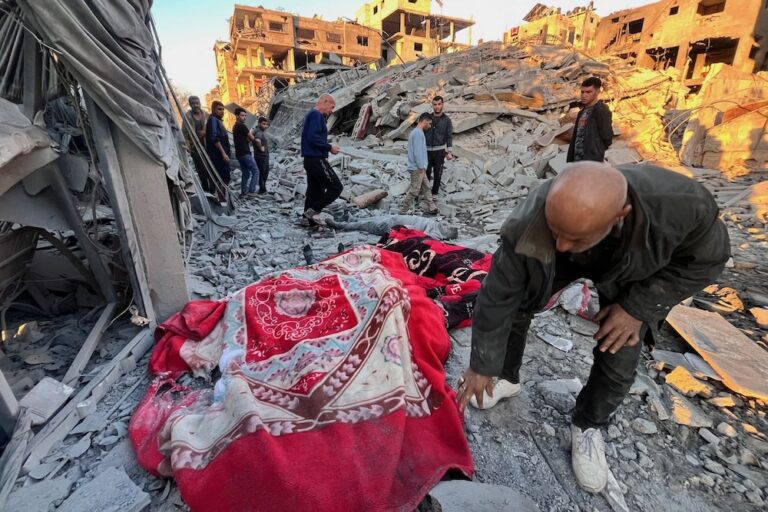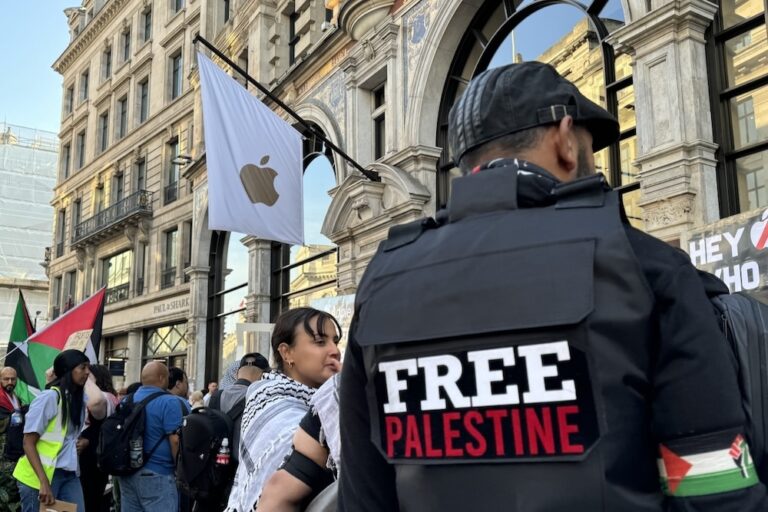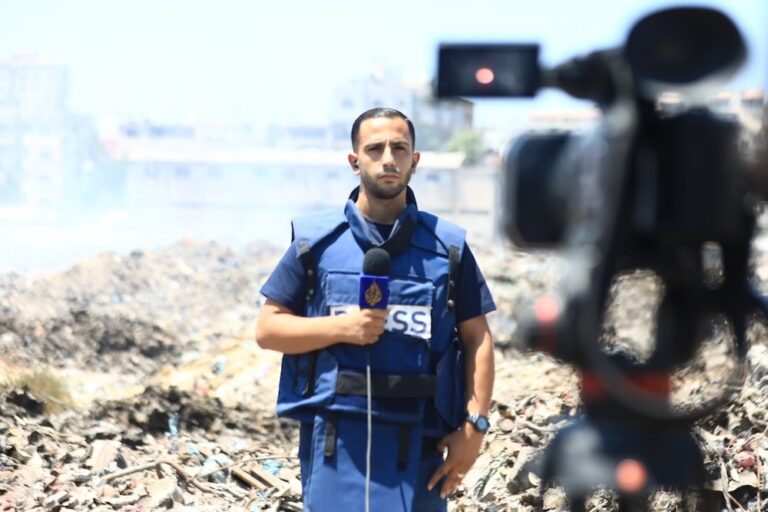(RSF/IFEX) – At least eleven journalists have come under fire and three of them have been wounded since the Israeli army declared Ramallah a “closed military zone” and barred the media from the West Bank city, the first such ban since the start of the second Intifada in September 2000. Three others were expelled from […]
(RSF/IFEX) – At least eleven journalists have come under fire and three of them have been wounded since the Israeli army declared Ramallah a “closed military zone” and barred the media from the West Bank city, the first such ban since the start of the second Intifada in September 2000. Three others were expelled from the city, bringing the number of journalists Israeli troops have either fired on, expelled or arrested, since Tsahal (Hebrew acronym for Israeli Defence Forces) entered Ramallah, to approximately thirty.
Calling the ban on journalists “a serious new attack on press freedom” in a situation that has steadily worsened over the past few months, on 2 April 2002, RSF Secretary-General Robert Ménard called on the Israeli civilian authorities to “cancel the ban immediately.” “Allowing the Israeli occupation of Ramallah to take place without media witnesses is to foment rumours and disinformation,” he said. Moreover, RSF expressed concern that, according to Agence France-Press (AFP) the army’s media ban was extended to Bethlehem on 2 April.
RSF notes that Article 19 of the International Covenant on Civil and Political Rights, ratified by Israel, guarantees the “freedom to seek, receive and impart information.”
Since the beginning of the second Intifada, RSF has counted fifty-two cases of journalists wounded by gunfire in the Occupied Territories and has established that most of the shooting was done by the Israeli army. The organisation has, on numerous occasions, deplored the lack of any serious army inquiry into these shootings. On 13 March, Italian journalist Raffaele Ciriello was killed in Ramallah by shots fired from an Israeli tank (see IFEX alerts of 19, 14 and 13 March 2002). RSF, once again, asks the authorities to seriously investigate all cases of journalists killed or wounded since September 2000.
On 29 March, Carlos Handal, a cameraman for the Egyptian television station Nile TV, was wounded by gunfire while on his way, by car, to Lions Square in Ramallah with a colleague.
On 30 March, a crew from the French TV station France 2 were fired at by Israeli troops when they attempted to pass a roadblock between East Jerusalem and Ramallah. The same day, Israeli soldiers broke into the headquarters of Palestinian TV and radio station, The Voice of Palestine, forcing it to go off the air. The troops ordered four journalists to leave their offices. The Ministry of Culture building which housed a local radio and TV station was also occupied. Moreover, on 30 March, Israeli soldiers entered a building that houses offices of several Palestinian and foreign media, including the British news agency Reuters, and forced the journalists to leave. Four Turkish journalists were detained for several hours at the Ramallah press centre by Israeli soldiers who searched them, confiscated their passports and prevented them from leaving the building.
On 31 March, the vehicle of Swedish journalists Bengt Norborg and Rickard Collsiöö, special correspondents for the Swedish public TV station SVT, was the target of warning shots fired by Israeli troops at a roadblock on the outskirts of Ramallah. An American journalist, Anthony Shahid of the “Boston Globe”, was hit in the shoulder by a bullet although he was wearing a bulletproof vest with “Press” written on it. Shahid said he did not see who fired at him but said the area was surrounded by Israeli tanks and soldiers at the time.
On 1 April, Israeli soldiers expelled an American CBS News television team from Ramallah. According to AFP, at the same time, a vehicle containing six Western reporters and photographers was fired at by Israeli troops near the city centre. “I think the soldiers got worked up and fired a hail of bullets in our direction,” said one of the journalists, who refused to be named. On the same day, a Palestinian journalist working for APTN (Associated Press Television News) was hit in the leg while covering a demonstration by pacifists in Beit Jala.
On 2 April, in Bethlehem, Majadi Banura, a cameraman for the Qatari TV station Al-Jazeera, was wounded in the head by a bullet while on a balcony on the fifth floor of the Star Hotel, where about twenty journalists are staying. The same day, Atta Iwisat, a photographer working for the Israeli daily “Yediot Aharonot” and the Gamma news agency, was arrested by Israeli soldiers when they discovered he was not properly accredited.


